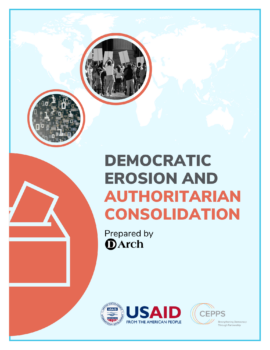
Over the past few years, the number of liberal democracies has declined, reinforcing an ongoing trend of democratic erosion over the past decade. Most recently, the number of liberal democracies dropped from 42 nations in 2020 to 34 in 2021. In 2021 alone, 33 countries became more autocratic while less than half – 15 – became more democratic.
Worryingly, the current era of democratic erosion is unlike analogous backsliding in the past; rather than the loss of democratic nations through military coups, today’s trend of illiberalism is driven by elected leaders who often won their positions through free and fair elections. Only once in power do these leaders begin undermining their country’s commitment to electoral democracy by attacking democratic institutions.
This report explores the ongoing trend of democratic erosion over the past decade with the aim of identifying its root causes. Through an extensive literature review, quantitative analysis of V-Dem and GEPT data, and the development of in-depth qualitative case studies, the report identifies six common factors – or “precursors” (Bairey et al., 2020) – associated with recent democratic erosion worldwide. The common factors include 1) increasing information control; 2) rising populism; 3) expanding polarization, social cleavages, and its fallout; 4) soaring inequality; 5) corruption and its consequences; and 6) pandemic-related backsliding.
New from the Consortium for Elections and Political Process Strengthening and Democracy Arch: “Democratic Erosion and Authoritarian Consolidation” was created with support from the United States Agency for International Development’s Democratic Elections and Political Processes Cooperative Agreement.